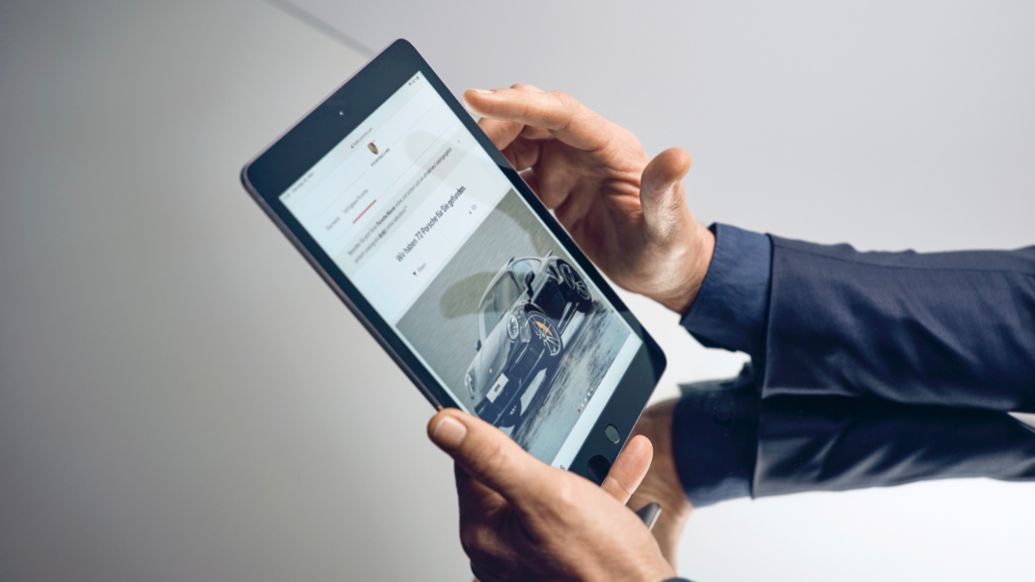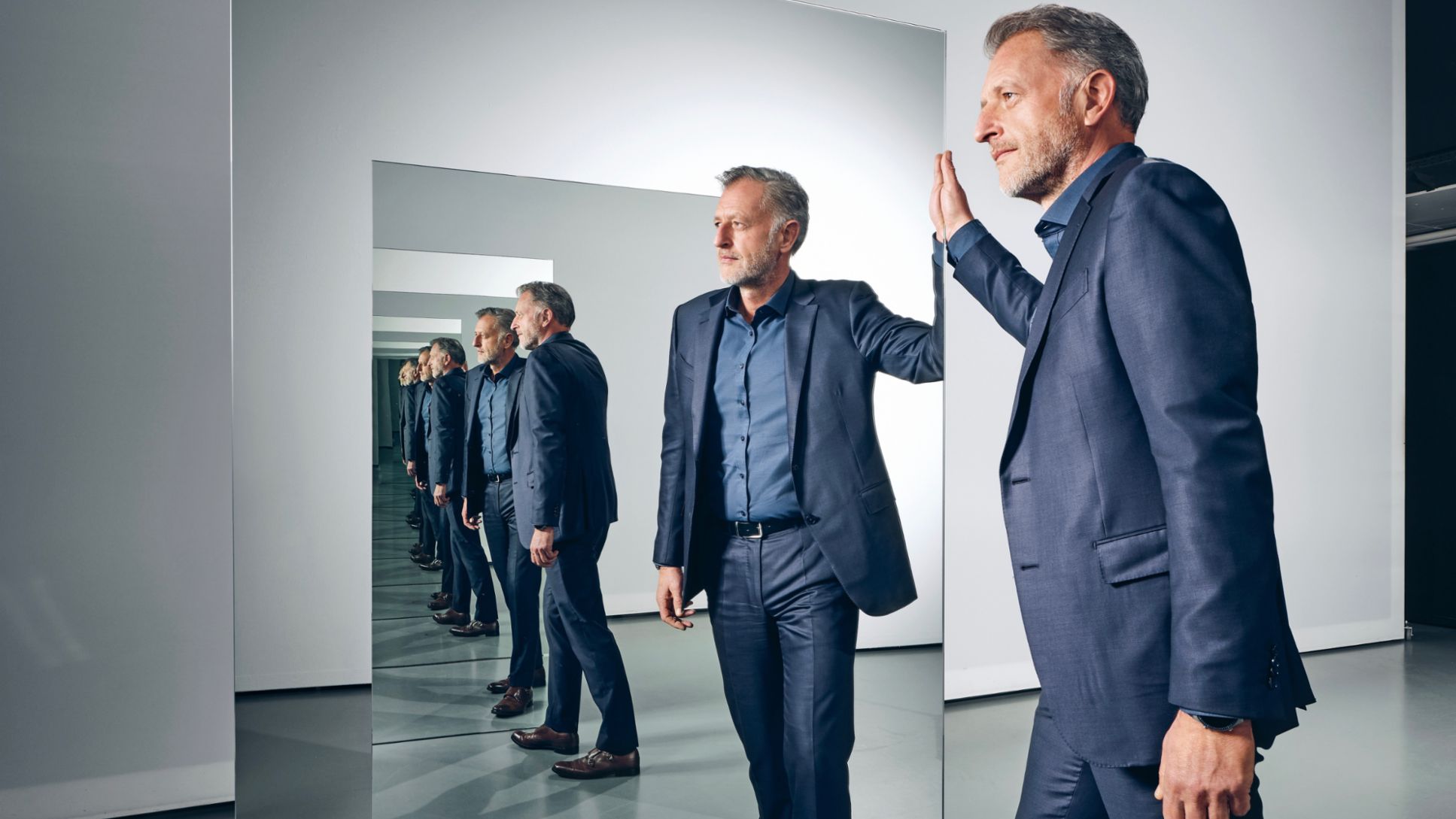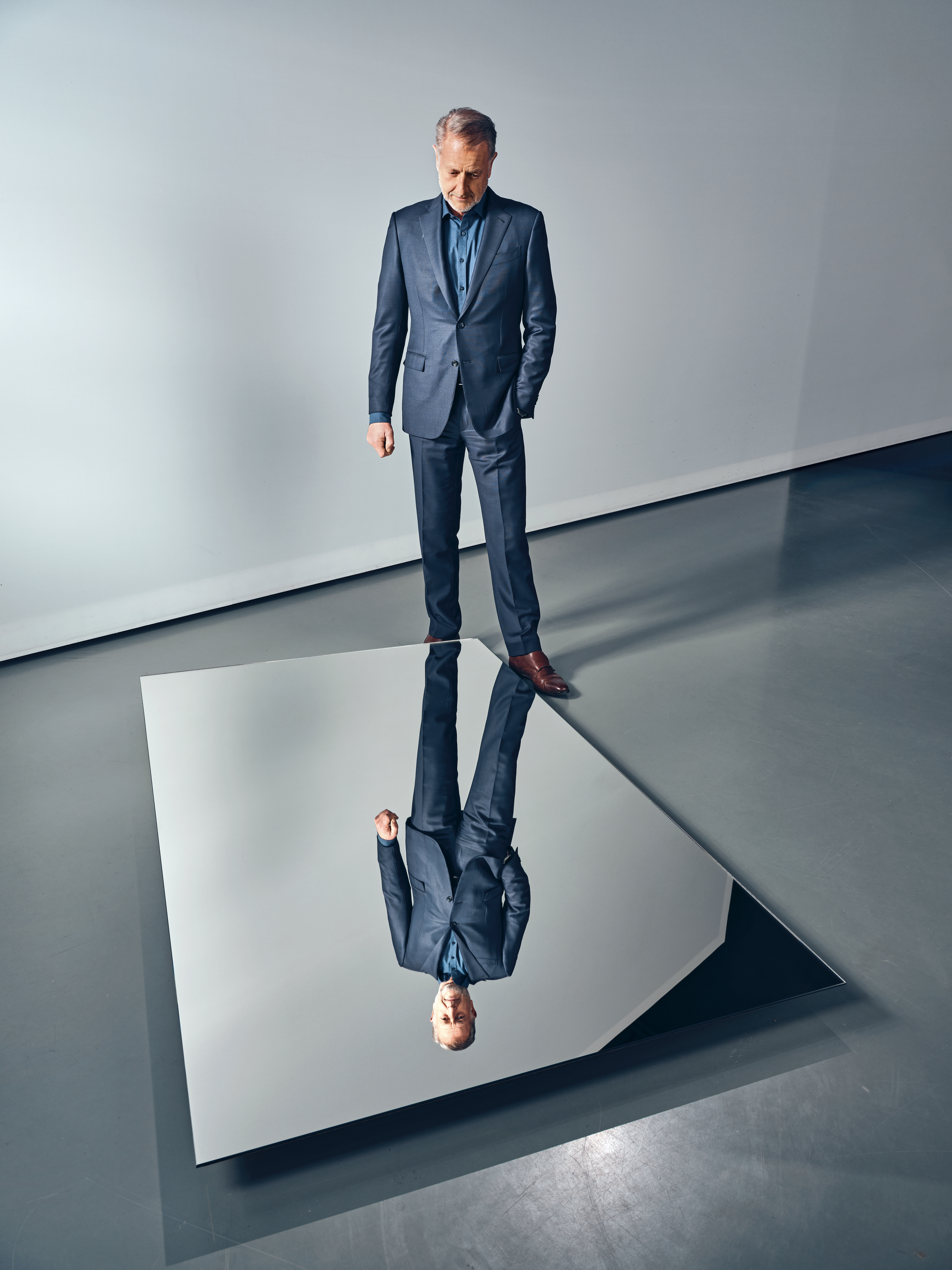Mr. von Platen, where do you get your ideas for new products?
Detlev von Platen: Every new product is basically a response to the wishes of our customers. Our sales department has a market research team that looks closely at their preferences. And we hold what are called “car clinics” to study which models could inspire them in the future.
Customer wishes vary a lot across regions, don’t they?
von Platen: That’s correct. Our contacts in the individual markets do research and provide ideas on a regular basis. All these insights were a key ingredient in the product creation process for the Taycan, for example. But I also believe in intuition. That includes being curious and open to new topics and inspiration.
What are your own sources of inspiration?
von Platen: My best ideas come when I travel in different parts of the world and observe what moves people and what fascinates them. I also benefit a lot from talking with young people.
How has the Porsche Taycan changed the brand’s image?
von Platen: The car is an impressive sign of how strongly Porsche is developing, yet at the same time remaining true to itself. It combines a new spirit of the age with the spirit of Porsche. The Taycan thrills everyone who gets behind the wheel. It embodies the brand’s values in special ways—by connecting tradition with a pioneering spirit, and by combining performance with sustainability. The Taycan has a lot to do with the fact that our brand is perceived as innovative. Not just because of its alternative powertrain but also because it sets new standards in connectivity and digitalization. In addition, the Taycan is a superb blend of the values the brand places on design and function. The Cross Turismo derivative is even more suitable for everyday driving, thanks to features like its large trunk space. Moreover, the Taycan embodies exclusivity on the one hand and social acceptance on the other.
Is the Taycan the new iconic model from Porsche—and if so, how important will the Porsche 911 still be for the brand?
von Platen: The 911 will always be the brand’s iconic model. It is both the root and the pinnacle of our model range. Every child recognizes its form. We’ve also been developing it further with each generation.
Is electrification the next step in its development?
von Platen: Our drivetrain technologies are tailored in flexible ways to Porsche’s core areas of expertise: all-electric sports cars, dynamic plug-in hybrids, and high-performance gasoline-powered cars. The 911 has traditionally had a rear engine, so we’re thinking more along the lines of a very dynamic hybrid like you see in racing. In the future, e-fuels will also give us the chance to run combustion engines in even more climate-friendly ways.
How can these trends be guided, or for that matter, launched—is Porsche a trendsetter?
von Platen: We don’t aspire to be the world champion in making announcements, or to impress the public with crazy ideas. We develop concepts we believe in. Real products and services are what count—ones that delight our customers and meet their expectations of quality. If we can surprise them in the process, all the better. That’s what authenticity means for us, and that’s what we stand for.
An international brand that wants to delight its customers probably cannot rely on a one-size-fits-all solution. How do actual mobility practices differ in Europe, the USA, and Asia?
von Platen: It’s not possible to make sweeping generalizations here. But you can detect certain preferences in each region. People in the USA, for example, have traditionally had a very strong desire for personal car ownership. But this desire is also on the rise in China—all the more so as a result of the pandemic.
Are you seeing developments that apply to the world in general?
von Platen: Urbanization is a major general trend affecting mobility. By the year 2050, around two-thirds of the world’s population will be living in cities, compared to 55 percent right now. So we need smart-city concepts: namely, ideas for how to achieve intelligent and sustainable transportation ecosystems.
“I believe in three-dimensional mobility.” Detlev von Platen
How important are alternative drive systems for these concepts?
von Platen: Electric mobility is playing a crucial role. But I also believe in developing new concepts of mobility. That includes three-dimensional approaches, which could open up entirely new ways of using time. We’re looking very closely at that type of thing as well.
How do age structures differ across markets, and how is Porsche approaching young people in particular?
von Platen: Our customers in China are around fifteen to twenty years younger on average than in Europe or the USA. We’re devoting special attention to attracting younger people to our brand in the western world, with the help of new topics like e-sports—in other words, virtual racing. We also expect to get into other sports like kitesurfing in order to increase our involvement with young people.
Are existing sales formats sufficient to handle these new approaches?
von Platen: Here too we’re thinking in new ways. In addition to the established Porsche Centers, we’ll be making greater use of retail platforms like Porsche Studios in city centers. Their focus is on providing hospitality and an inviting atmosphere in addition to brand experiences and human interaction. These are places where I like to enjoy a cup of coffee. The vehicles themselves are a bit more in the background. There are two examples right now in Hanoi in Vietnam, and in Tainan in Taiwan. More will follow in Europe and the USA.
You’re placing a greater focus on selling cars online. Is that the wave of the future?
von Platen: Online sales are off to a successful start and the rollout will continue. We launched this option in Germany in October 2019 and have since extended it to twelve more European countries. We set up similar channels in China and the USA in the fall of 2020, which we’re in the process of expanding. What we’re doing here is deliberately offering our dealers an additional platform. More than 65,000 online queries and car orders were made across all markets in 2020 alone.
Does that mean all Porsche sales will soon be taking place online?
von Platen: On the contrary! Our vision is to offer seamless customer journeys. We devote all our efforts to our customers and to enabling them to contact the Porsche brand whenever they want. They can move effortlessly between online options and the physical world of Porsche.

What will be the purpose of Porsche Centers in the future?
von Platen: Our partners will continue to play a very important role. Customers cherish the personal connections with their sales consultants. The Destination Porsche retail concept will make the Porsche Centers even more into meeting places for our community. We’re also offering flexible modules that let dealers easily adapt their showrooms to new developments. Following our first prototype in California and pilot centers in Hangzhou and Dortmund, we’ll be extending the concept over the coming years to all Porsche Centers around the world.
In short, we’re strengthening our core sales format while also pursuing an omnichannel approach with the best possible combination of digital and contemporary brick-and-mortar options. And thereby making our products equally attractive to male and female target groups.
Apropos the percentage of female buyers, China stands out…
von Platen: Indeed, in China nearly as many women as men are buying Porsche vehicles—46 percent, to be exact. This is considerably higher than in other markets.
What needs to be done to interest more women buyers in other markets, for example in Germany?
von Platen: We need to further increase our relevance for women’s lifestyles here, and address women in more targeted ways with our communications. One example is our project with Olivier Rousteing, the French head designer for Balmain—and a star in the fashion world. He’s been a Porsche fan since childhood and has recently made some videos with the Panamera for social media. We’re working intensively on more such projects.
You were born in Orléans. How much have you been influenced by the French way of life?
von Platen: I’d say my French roots have taught me to value and enjoy what is beautiful in life, a certain savoir vivre.
And how were you shaped by life in the USA?
von Platen: That period of my life is largely responsible for my generally positive outlook. And for my motto, which is to always attempt the impossible in order to achieve the possible. It has helped me a lot over the past year. I’ve been able to keep viewing the COVID-19 situation as an opportunity, and I’m convinced that we at Porsche will emerge stronger from it. All in all, my experiences in different countries have been extremely helpful to me, and I’m happy to share them in the course of my work at Porsche.
Detlev von Platen
Detlev von Platen grew up in France and has lived in various other countries in connection with his work. His first stint in Germany some thirty years ago was followed by another sojourn in France. He later worked for Porsche in the USA. Since 2015, he has been based in Zuffenhausen as the Member of the Porsche Executive Board responsible for Sales and Marketing.
Info
Text first published in the Porsche magazine Christophorus, No. 399.



